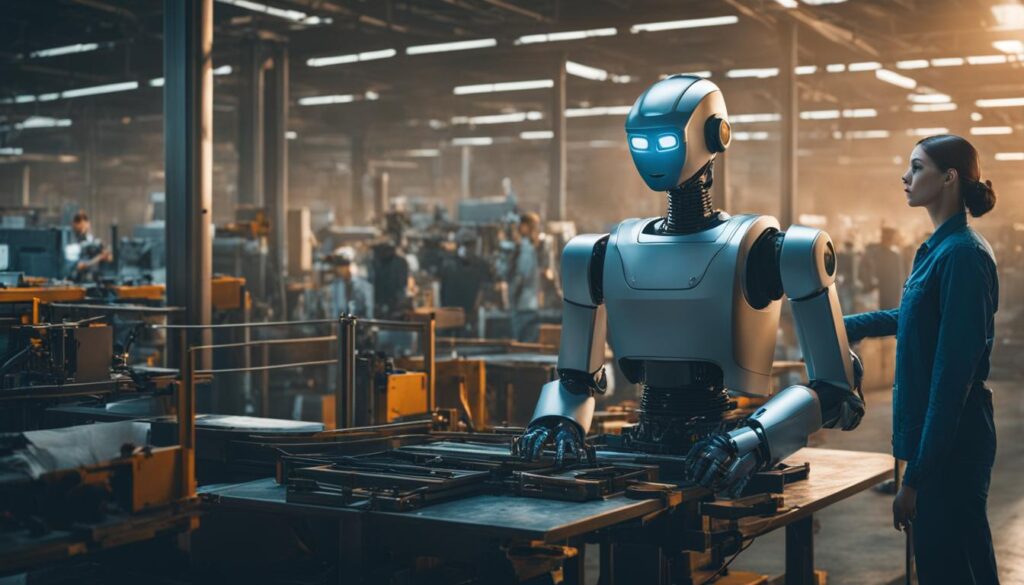Artificial intelligence (AI) is revolutionizing every aspect of our lives, reshaping the way we integrate information, analyze data, and make decisions. From finance to health care, transportation to national security, AI is making its mark across various sectors, presenting both opportunities and challenges for society, the economy, and governance.
With its wide-ranging applications and transformative capabilities, AI is redefining what is possible in the modern world. Its algorithms possess qualities like intentionality, intelligence, and adaptability, enabling them to make decisions, learn, and adapt just like humans. This opens up endless possibilities for enhanced analysis, decision-making, and problem-solving.
Key Takeaways:
- AI is transforming every walk of life, revolutionizing industries, and presenting challenges for society.
- AI algorithms possess intentionality, intelligence, and adaptability, enabling them to make decisions and learn like humans.
- AI has applications in sectors such as finance, health care, transportation, and national security.
- Policy and ethical considerations need to address challenges like algorithmic bias, data access, and AI liability.
- To maximize AI benefits, recommendations include increased data access, government funding, and digital education.
The Qualities of Artificial Intelligence
Artificial intelligence (AI) algorithms possess unique qualities that make them powerful tools for decision-making. These algorithms are intentional, intelligent, and adaptable, allowing them to analyze data, make informed choices, and learn from their experiences.
AI operates with intentionality, meaning it can set goals and take actions to achieve those goals. It can understand the context of a problem, evaluate different options, and make decisions based on the desired outcome. This quality enables AI to perform tasks that normally require human expertise, such as diagnosing diseases or predicting financial trends.
The intelligence of AI algorithms allows them to process and analyze vast amounts of data in real-time. They can quickly extract insights, recognize patterns, and identify correlations that may not be apparent to humans. This ability to make sense of complex information enhances decision-making processes and opens up new possibilities for problem-solving.
One of the most remarkable qualities of AI is its adaptability. AI algorithms can learn and evolve as they make decisions and interact with their environment. They can adjust their strategies based on feedback, improving their performance over time. This adaptability makes AI valuable in dynamic and ever-changing fields, such as finance or cybersecurity, where quick and accurate decision-making is essential.
Overall, the qualities of intentionality, intelligence, and adaptability make AI algorithms a powerful force for innovation and progress. They have the potential to revolutionize various industries and augment human capabilities, bringing about significant changes in the way we live, work, and make decisions.
| Qualities | Examples |
|---|---|
| Intentionality | Diagnosing diseases, predicting financial trends |
| Intelligence | Analyzing complex data, recognizing patterns |
| Adaptability | Learning from feedback, adjusting strategies |
AI Applications in Diverse Sectors
Artificial intelligence (AI) is revolutionizing various sectors, including finance, national security, health care, criminal justice, transportation, and smart cities. AI has already made a significant impact in these industries and continues to augment human capabilities, driving economic growth and transforming the way we operate.
Finance
In the finance sector, AI is utilized for making loan decisions and creating personalized investment portfolios. AI algorithms analyze vast amounts of financial data to assess creditworthiness and predict market trends, enabling more accurate and efficient decision-making. This improves customer experiences and helps financial institutions manage risk effectively.
National Security
AI plays a crucial role in national security by analyzing large volumes of data to identify patterns, detect threats, and generate actionable intelligence. It assists in monitoring and safeguarding critical infrastructure, identifying potential cybersecurity vulnerabilities, and supporting intelligence operations. AI helps government agencies stay ahead of emerging threats and enhances national defense capabilities.
Health Care
The Health Care industry benefits from AI in multiple ways. AI-powered systems aid in medical research, diagnosing diseases, and developing personalized treatment plans. Machine learning algorithms analyze patient data to identify patterns and provide insights for improving patient outcomes. AI also plays a role in streamlining administrative tasks, such as managing medical records and optimizing resource allocation.
Criminal Justice
AI is transforming the criminal justice system by assisting in tasks such as predictive policing, case analysis, and recidivism prediction. Machine learning algorithms process vast amounts of data, including crime records and demographic information, to identify high-risk areas, optimize resource allocation, and support evidence-based decision-making. AI can help law enforcement agencies prioritize investigations and allocate resources more efficiently.
Transportation and Smart Cities
In the transportation sector, AI is used for optimizing traffic flow, predicting demand, and improving logistics. AI-powered systems can analyze real-time data from sensors and cameras to manage traffic congestion, reduce travel time, and enhance overall efficiency. In smart cities, AI enables better management of resources, including energy, water, and waste management systems. It also contributes to enhancing public safety and security through intelligent surveillance systems.
These examples demonstrate the diverse applications of AI in various sectors, highlighting its potential to drive innovation, improve decision-making, and enhance the quality of services across industries.
Policy, Regulatory, and Ethical Issues of AI
As artificial intelligence (AI) continues to advance and integrate into various sectors, it brings with it a range of policy, regulatory, and ethical concerns. These issues are crucial to address to ensure responsible and equitable implementation of AI technologies.
One significant area of concern is algorithmic bias. AI systems are only as good as the data they are trained on, and if that data is biased or incomplete, it can lead to discriminatory outcomes. For example, if a facial recognition algorithm is trained on predominantly white faces, it may struggle to accurately identify individuals with darker skin tones, leading to biased and unfair outcomes. Addressing algorithmic bias requires comprehensive data collection, diverse training data, and ongoing evaluation and refinement of AI systems.
Data access problems also pose challenges in the realm of AI. As AI relies on vast amounts of data for training and decision-making, there is a need for policies that ensure equitable access to data sources. This includes considering issues of privacy, security, and data ownership. Striking the right balance between data accessibility and protection is essential for fostering innovation and preventing the concentration of power in the hands of a few.
“Policy, regulatory, and ethical issues surrounding AI are complex and multifaceted, requiring collaboration between governments, businesses, and civil society to find solutions that benefit society as a whole.”
Ethical considerations in AI implementation are also paramount. AI systems have the potential to make decisions that have profound implications for individuals and society at large. Ensuring transparency and accountability in AI decision-making processes is essential to maintain public trust. This includes addressing questions of liability when AI systems make erroneous or harmful decisions.
In terms of policy and regulation, it is crucial to take a broad approach that focuses on AI principles rather than specific algorithms. The fast-paced nature of AI development means that targeting individual algorithms may not be effective in the long run. Instead, policies should prioritize ethical principles, human oversight, and mechanisms for penalizing malicious AI behavior. This approach can help mitigate the risks associated with AI while fostering innovation and societal benefits.
| Policy and Regulatory Issues | Ethical Issues | AI Decisions | Algorithmic Bias | Data Access Problems |
|---|---|---|---|---|
| Comprehensive regulations that prioritize ethical principles | Ensuring transparency and accountability in AI decision-making | Developing mechanisms for penalizing malicious AI behavior | Addressing biases in AI systems | Striking a balance between data accessibility and privacy |
| Policies that focus on AI principles rather than specific algorithms | Addressing questions of liability for AI decisions | Developing diverse training data to mitigate bias | Ensuring equitable access to data sources | Addressing data ownership and security concerns |
| Collaboration between governments, businesses, and civil society | Maintaining human oversight of AI systems | Ensuring transparency in AI decision-making processes | Evaluating and refining AI systems to prevent bias | Preventing the concentration of power in data |
Recommendations for Maximizing AI Benefits

To fully harness the potential of artificial intelligence (AI) and maximize its benefits, several key recommendations have been put forward. By implementing these recommendations, policymakers, organizations, and individuals can ensure that AI technology is leveraged responsibly and effectively.
Promoting Data Access
Maximizing AI benefits starts with ensuring that researchers have access to high-quality data while protecting personal privacy. By encouraging greater data access, we can unlock valuable insights and spur innovation across various sectors. However, it is crucial to establish robust security measures to safeguard sensitive information and ensure data privacy.
Increasing Government Funding
Government support is essential for driving AI advancements and research. By increasing funding for unclassified AI research, governments can foster innovation and development in this field. This investment will enable the exploration of new AI applications and drive economic growth.
Promoting Digital Education and Workforce Development
As AI continues to transform industries, it is vital to equip individuals with the necessary skills to thrive in this new landscape. Promoting digital education and AI-focused workforce development programs will help prepare workers for the evolving job market. By investing in training and education initiatives, we can bridge the AI skills gap and empower individuals to adapt to the changing technological landscape.
Establishing an AI Advisory Committee
To effectively navigate the complexities of AI implementation, the establishment of a federal AI advisory committee is recommended. This committee would comprise experts from various fields and provide policy recommendations, ensuring that AI is used responsibly and ethically. Collaboration with state and local officials is also crucial in enacting effective policies that address the specific needs and challenges of different regions.
Regulating Broad AI Principles
Addressing the policy and regulatory challenges posed by AI requires a comprehensive approach. Instead of focusing on specific algorithms, regulations should be based on broad AI principles. This approach allows for flexibility and adaptability as AI technology evolves. Additionally, it is essential to address concerns related to bias complaints seriously, maintain human oversight and control, and promote cybersecurity to ensure the responsible implementation of AI.
| Recommendations for Maximizing AI Benefits |
|---|
| Promote data access while protecting privacy |
| Increase government funding for unclassified AI research |
| Promote digital education and AI workforce development |
| Establish a federal AI advisory committee |
| Regulate broad AI principles |
The Impact of AI on Work and Jobs

The rapid advancement of artificial intelligence (AI) has had a significant impact on the world of work and jobs. While the immediate effects may not be as drastic as predicted, AI is already transforming certain job functions and creating new opportunities for employees.
One of the key ways in which AI is impacting work is through automation. AI algorithms are streamlining processes and improving efficiency in areas such as coding, marketing, legal, and health care administration. Tasks that were once time-consuming and labor-intensive can now be automated, allowing employees to focus on more creative and complex tasks. This shift towards automation has the potential to improve productivity and free up time for innovation.
However, there are concerns about job displacement as a result of AI. Some fear that AI will replace human workers entirely, leading to widespread unemployment. While job displacement is a possibility, it is important to note that AI also has the potential to transform jobs rather than eliminate them. As AI takes over repetitive and mundane tasks, employees can upskill and focus on areas that require human judgment, problem-solving, and emotional intelligence.
The future of work will likely involve a combination of human and AI collaboration, where AI assists humans in their work rather than replacing them. The partnership between humans and AI can leverage the strengths of both, leading to more efficient and effective outcomes. As AI continues to evolve, individuals and organizations need to adapt and embrace new ways of working to fully harness the benefits of this transformative technology.
Table: AI Impact on Work
| AI Impact on Work | Description |
|---|---|
| Job Automation | AI automates repetitive and mundane tasks, freeing up time for employees to focus on more complex and creative tasks. |
| Job Displacement | While some jobs may be automated, AI also has the potential to transform jobs and create new opportunities for upskilling. |
| Job Transformation | AI shifts the nature of jobs, requiring employees to develop skills in areas such as problem-solving, emotional intelligence, and human judgment. |
The Future Outlook of AI in the Workplace

As artificial intelligence (AI) continues to advance, its impact on the workplace is expected to be significant. AI advancements, such as personalized learning and machine-driven learning, will revolutionize how employees acquire knowledge and develop their skills. Peer-to-peer learning will also play a crucial role in fostering collaboration and knowledge sharing among individuals and AI systems.
With personalized learning, AI algorithms can analyze individual employee’s strengths, weaknesses, and learning preferences to create tailored learning experiences. This approach ensures that employees receive the most relevant and effective training based on their specific needs. Machine-driven learning, on the other hand, involves AI systems gathering and analyzing vast amounts of data to identify patterns, make predictions, and generate insights. This data-driven approach enables employees to make more informed decisions and enhances their problem-solving capabilities.
Additionally, peer-to-peer learning will become increasingly important in the future workplace. AI systems will facilitate interactions between employees and encourage collaboration, allowing them to share knowledge, expertise, and insights. This collaborative approach to learning empowers employees to learn from one another and leverage their collective intelligence.
| Advancements in AI | Impact on the Workplace |
|---|---|
| Personalized Learning | AI algorithms analyze individual employee data to create tailored learning experiences, improving skill development. |
| Machine-Driven Learning | AI systems analyze large datasets to generate insights and predictions, enhancing decision-making capabilities. |
| Peer-to-Peer Learning | AI facilitates collaboration and knowledge sharing among employees, fostering a culture of continuous learning. |
As AI continues to evolve, it will reshape the way businesses operate and how employees navigate their career paths. The future workplace will be characterized by a harmonious collaboration between humans and AI systems, where AI assists in routine tasks, enhances productivity, and enables employees to focus on more complex and creative endeavors. Organizations need to embrace these advancements in AI and foster a culture that values continuous learning and adaptability to thrive in the future of work.
The Importance of Lifelong Learning
With the rapid pace of AI advancements, employees must embrace lifelong learning. As AI technologies continue to evolve and disrupt industries, the skills required in the workplace will also change. Lifelong learning will empower individuals to adapt and acquire new skills that are in demand, ensuring their continued relevance in the workforce.
“The illiterate of the 21st century will not be those who cannot read and write, but those who cannot learn, unlearn, and relearn.” – Alvin Toffler
By cultivating a mindset of continuous learning, individuals can stay ahead of the curve and effectively leverage the benefits of AI in the workplace. This proactive approach to learning will not only enhance job security but also open up new opportunities for growth and career advancement.
In conclusion, the future of AI in the workplace holds immense potential. Advancements in personalized and machine-driven learning, along with the fostering of peer-to-peer collaboration, will shape a new era of work that is characterized by greater efficiency, productivity, and innovation. By embracing lifelong learning and leveraging the power of AI, employees can navigate the future of work with confidence and thrive in a rapidly changing world.
Responsible AI Implementation: Balancing Benefits with Ethics, Accuracy, and Liability
Responsible AI implementation requires careful consideration of ethical considerations, AI accuracy, and AI liability. While AI algorithms offer significant advantages, it is essential to ensure that they are used responsibly and ethically. Accuracy is a crucial aspect of AI implementation, as relying solely on AI-generated information can lead to misinformation and misinterpretation. Therefore, it is important to verify and fact-check AI-generated content to maintain the integrity of the information being presented.
Furthermore, ethical considerations must be taken into account when implementing AI. AI systems should be designed to prioritize the well-being and interests of individuals and society as a whole. This includes addressing issues such as algorithmic bias, which can perpetuate unfair practices or discrimination. By actively working to eliminate bias and ensure fairness, responsible AI implementation can contribute to a more equitable society.
“Responsible AI implementation requires a commitment to transparency, accountability, and fairness. It is not enough to solely rely on AI algorithms; there must be human oversight and control to ensure that AI systems are working in the best interest of individuals and society.”
Another aspect of responsible AI implementation is addressing liability. As AI systems become increasingly integrated into various industries and sectors, questions of responsibility and liability arise. It is essential to establish legal frameworks and guidelines to determine who is liable for AI-generated decisions and actions. By clarifying liability, organizations can mitigate potential risks and ensure accountability in the event of AI-related issues or incidents.
Table: Responsible AI Implementation Considerations
| Consideration | Description |
|---|---|
| Accuracy | Verifying and fact-checking AI-generated content to ensure accuracy and reliability. |
| Ethical Considerations | Addressing issues such as algorithmic bias to promote fairness and prevent discrimination. |
| Human Oversight | Ensuring that AI systems have human oversight and control to prioritize human well-being and societal interests. |
| Liability | Establishing legal frameworks to determine liability for AI-generated decisions and actions. |
Responsible and ethical AI implementation is crucial for harnessing the full potential of AI while minimizing risks and ensuring fairness. By considering accuracy, ethical considerations, human oversight, and liability, organizations can navigate the complex landscape of AI implementation with confidence and integrity.
Conclusion
The impact of AI is already being felt across various sectors, presenting both opportunities and challenges for society. As AI continues to evolve, its potential to revolutionize industries and transform work is undeniable. While there are ethical considerations and concerns about AI accuracy, responsible implementation and collaboration between humans and AI can lead to positive outcomes.
Looking to the future, the possibilities for AI are immense. It has the potential to greatly enhance decision-making processes, advance technology, and shape the world we live in. However, it is crucial to carefully consider the impact of AI and ensure that it is used for the benefit of humanity.
As we move forward, it is important to strike a balance between harnessing the power of AI and maintaining human oversight and control. AI should be seen as a tool to enhance human capabilities and decision-making, rather than replacing human judgment entirely. By doing so, we can maximize the benefits of AI while addressing the challenges and ethical considerations it presents.
The future of AI holds great promise and potential. With responsible implementation and continuous collaboration, AI can contribute to a more efficient, productive, and innovative society. By embracing AI and carefully navigating its impact, we can build a future where humans and AI work together to create a better world.
FAQ
How is artificial intelligence (AI) changing the world?
What are the qualities of artificial intelligence?
Where can AI be applied?
What policy, regulatory, and ethical issues are associated with AI?
What recommendations are there for maximizing AI benefits?
What are the main ways artificial intelligence is transforming various industries?
How ai isn’t changing the way we interact with technology?
How is artificial intelligence (AI) influencing the future of work?
How is deep learning shaping the future of AI development?
How is human intelligence being impacted by today’s AI?
Source Links
- https://www.brookings.edu/articles/how-artificial-intelligence-is-transforming-the-world/
- https://www.forbes.com/sites/marenbannon/2023/06/22/how-ai-is-changing-the-future-of-work/?sh=2669886972e0
- https://www.forbes.com/sites/forbesbusinesscouncil/2023/07/24/artificial-intelligence-is-changing-the-world-and-your-business/?sh=2669888e2900

